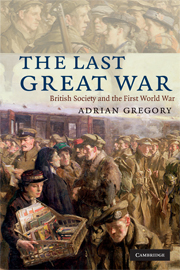Book contents
- Frontmatter
- Contents
- Illustrations
- Acknowledgements
- Introduction: The war that did not end all wars
- 1 Going to war
- 2 Defining the enemy: Atrocities and propaganda 1914–1915
- 3 From spectatorship to participation; From volunteering to compulsion 1914–1916
- 4 Economies of sacrifice
- 5 Redemption through war: Religion and the languages of sacrifice
- 6 The conditional sacrifices of labour 1915–1918
- 7 Struggling to victory 1917–1918
- 8 The last war?
- Conclusion
- Notes
- Index
3 - From spectatorship to participation; From volunteering to compulsion 1914–1916
Published online by Cambridge University Press: 05 June 2014
- Frontmatter
- Contents
- Illustrations
- Acknowledgements
- Introduction: The war that did not end all wars
- 1 Going to war
- 2 Defining the enemy: Atrocities and propaganda 1914–1915
- 3 From spectatorship to participation; From volunteering to compulsion 1914–1916
- 4 Economies of sacrifice
- 5 Redemption through war: Religion and the languages of sacrifice
- 6 The conditional sacrifices of labour 1915–1918
- 7 Struggling to victory 1917–1918
- 8 The last war?
- Conclusion
- Notes
- Index
Summary
Your country knows that it is no light sacrifice that she demands of you …
If you do not go willingly to-day, you and your children and your children's children may have to go unwillingly to wars even more terrible than this one.
Recruiting advertisement, Daily Express, 10 February 1915Spectators
A cartoon in The Passing Show in June 1915 shows a young man about town, monocled and smoking a cigarette through an exaggerated holder, standing in front of a shop window. The window carries a poster of soldiers going into battle and, underneath, the slogan ‘Don't stand looking at this, Come and Help.’ The caption, referring to the young man, is: ‘Who's looking?’
It was a complicated joke. The poster exhorts the move from spectatorship to participation, yet the ‘knut’ is not even engaged as a spectator. The line between spectatorship and participation could be blurred. In May 1915, the weekly issued a heavily ironic ‘Six don'ts for patriotic civilians’. Advice included: ‘be phlegmatic … The Press Bureau will tell you when to get excited: till then forget there is a war on’; when troops go by, ‘don't take your hat off … it is liable to distract attention from shop windows’; civilians shouldn't cheer: ‘Cheering is only permissable at horse races, football matches, strike meetings and in the trenches’; civilians shouldn't go out ‘without a plentiful supply of White Feathers’; they should ‘cultivate an upright and military bearing’, so that even if they were not in the volunteer reserve, people would think they were.
- Type
- Chapter
- Information
- The Last Great WarBritish Society and the First World War, pp. 70 - 111Publisher: Cambridge University PressPrint publication year: 2008



